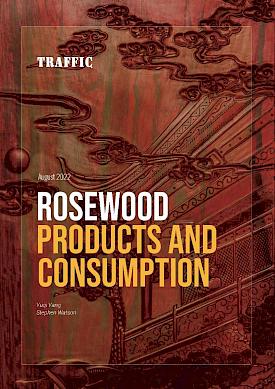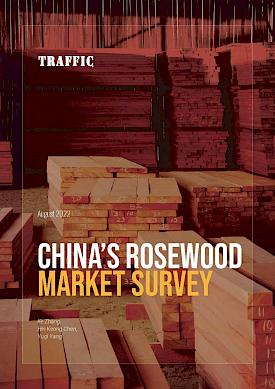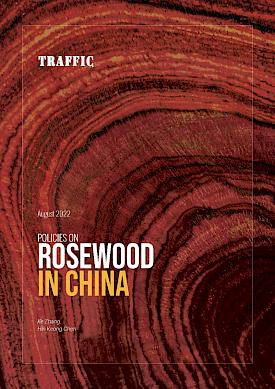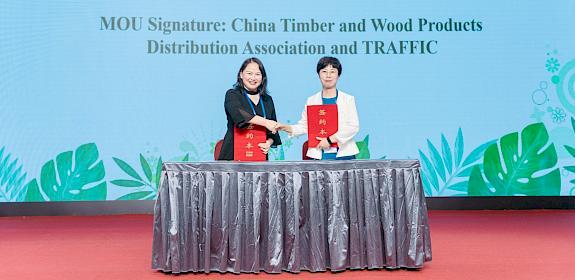Global Wood Trade Conference 2022 Nanning China: Engaging China’s Champions of Change Towards Responsible Rosewood Consumption
7 September 2022, Nanning, China - The 2022 Global Wood Trade Conference was co-hosted by China Timber and Wood Product Distribution Association, TRAFFIC and other partners in Nanning, the capital city of Guangxi Zhuang Autonomous Region of China on 5-7 September 2022. This Conference aimed to establish an exchange platform for experts in the " Belt & Road" initiative (BRI) countries and first-line operators from the wood industry around the world.
Rosewood products and consumption China's Rosewood market survey Policies on Rosewood in China
During the Conference, TRAFFIC released three reports titled China’s Rosewood Market Survey, Policies on Rosewood in China, and Rosewood Products and Consumption, during the sessions on “Jointly Promote Responsible Wood Trade & Investment” and “China-Vietnam Wood Trade.”
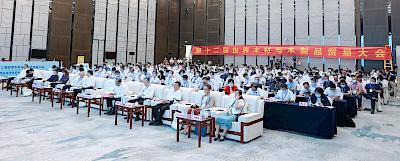
TRAFFIC’s findings on China’s market trends, global and national rosewood policy and regulatory frameworks, as well as the attitudes and behaviours of consumers in 2018-2021 helps to fill in the post-covid knowledge gaps related to rosewood trade and its demand in China, the world’s largest rosewood consumer market.
The rosewood industry in China has developed rapidly, in line with the growing development of China’s economy. Throughout the 21st century and until 2019, when the COVID-19 pandemic struck, both rosewood trade volume and value remained at a consistently high level. China has been improving its legislation to protect native rosewood species, but additional efforts are recommended by TRAFFIC’s research to further strengthen the legislative framework in order to cover the whole supply chain, with the aim to ensure the traceability and legality of rosewood products back to the source that is entering the Chinese market.
The high demand for rosewood products and the presence of illegal timber in the supply chains have attracted international attention due to the associated negative impacts on the environment, governance and revenues for governments, and also on livelihoods of local communities in range countries.
Chen Hin Keong, Senior Advisor – Forest Governance and Trade of TRAFFIC said, "The industry can improve its rosewood product supply chain traceability and legality to source legal and sustainable supplies. Law enforcement can help to combat the laundering of illegally sourced timber. Together this will help China’s efforts to support sustainable and legal supply chains of producer countries. Amendments to regulations in line with those identified in the policy review and market research reports should complement these actions and align with the findings in the consumer-focused study."
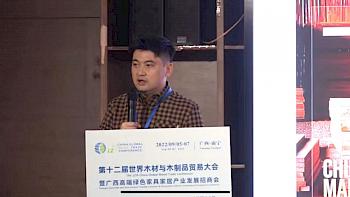
ZHANG Ke, Timber Project Manager of TRAFFIC China, in his presentation shared with the conference participants practical experience of sustainable sourcing and supply chain management with timber importers from the perspective of an international organisation. The presentation highlighted that the price of rosewood products has the potential to increase based on the market analysis, particularly in the medium and higher valued rosewood species in demand by the market in the coming years; and the price at the lower end of the market is more stable because of the availability of cheaper substitute species, not listed in the official Hongmu Standard1.
“The prospect of China's huge rosewood market deserves attention. Both public and private sectors need to work together to guide responsible consumption”, ZHANG Ke explained. “Our consumer research revealed that the most persuadable buyers of rosewood products claim to be influenced by legal risks and report they might reduce purchasing for ecological concerns. The findings provide evidence and insights for the design of behaviour change communications to promote the responsible use of rosewood.”
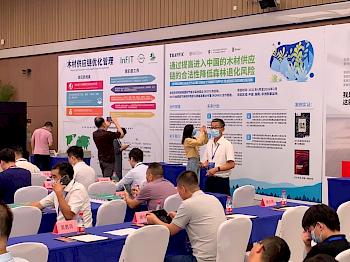
As a tangible follow-up, TRAFFIC’s NICFI (Norway’s International Climate and Forest Initiative) project titled “Leveraging Legality along China’s Timber Supply to Reduce Deforestation" under the financial support of NORAD (Norwegian Agency for Development Cooperation ) will help implement further work to provide solutions to law enforcement, industry cooperation, sustainable public procurement, wood species identification, policy risk applications, and green financing, as highlighted in the now released reports.
The publications were produced with the financial support of the European Union “China’s Champions of Change” initiative.
On 13 August 2022, a preliminary launch of the rosewood reports was carried out during the World Wood Floor (Wood Science & Technology) Conference in Deqing, Zhejiang Province of China. In these two events, there were more than 2000 participants from the timber and wood industry of China, and overseas participants joined the events online.
Notes:
1: China classifies Hongmu through the National Hongmu Standard, which refers to the heartwood of 29 selected species from several different genus, some of which are listed under the Convention on International Trade in Endangered Wild Fauna and Flora (CITES)
Norway's International Climate and Forest Initiative
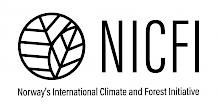
NICFI is administered by the Norwegian Ministry of Climate and the Environment in collaboration with Norad – The Norwegian Agency for Development Cooperation. The initiative supports bilateral agreements with forest countries, multinational organisations and civil society.


